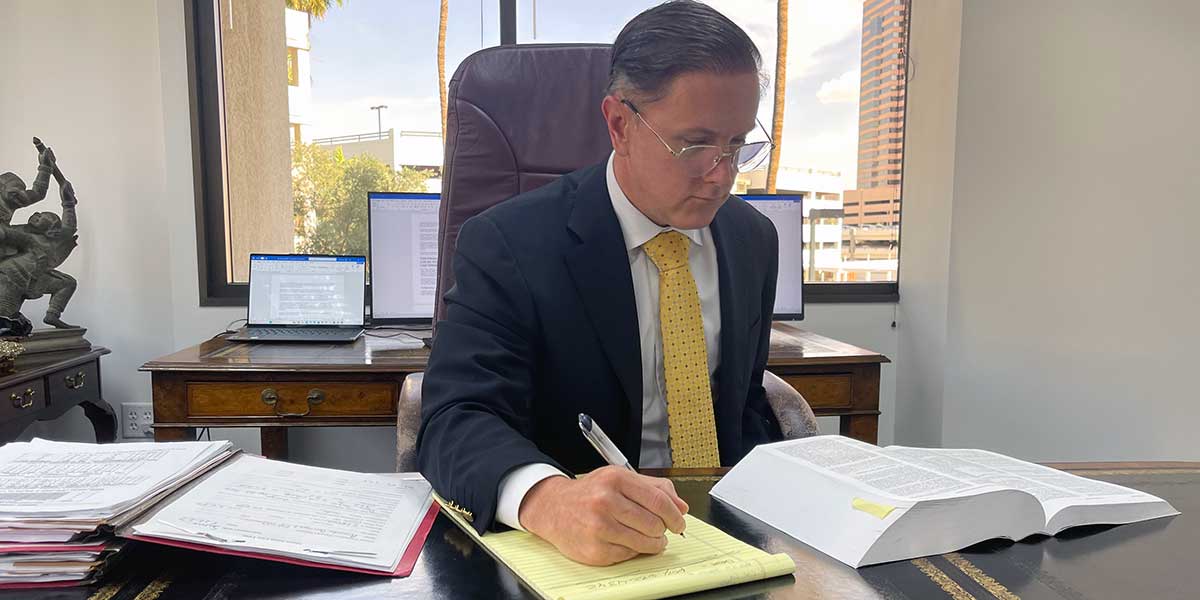DNA Testing Laws and Regulations- ARS-13-610

In Arizona, DNA testing in criminal cases is governed by Arizona Revised Statute ARS-13-610.
This law mandates the collection of DNA samples from individuals arrested for a felony offense or certain misdemeanor offenses.
The implications of having DNA evidence used against you in court can be severe; it can lead to criminal convictions and have long-lasting effects on your personal and professional life.
A study conducted by the National Institute of Justice revealed that approximately 80% of cases where DNA evidence was used resulted in a conviction.
When you're up against charges that involve DNA evidence, having an expert criminal defense attorney is key. At Kolsrud Law Offices, we know Arizona laws inside and out. We can help you understand the rules, defend your rights, and question the evidence against you.

What is the DNA Law in Arizona?
Arizona has specific regulations around DNA testing, governed primarily by ARS-13-610. This statute details the conditions under which law enforcement is authorized to collect DNA samples. Specifically, individuals convicted of a felony and those in prison, parole, probation, or juvenile detention are subject to DNA collection.
These samples are held by Arizona law enforcement agencies and the Arizona Department of Public Safety and may be reported to the FBI database.
The state has also expanded the parameters for DNA collection to include those arrested but not yet convicted for specified dangerous or serious crimes. In cases where a person has a prior felony conviction, any collected DNA can be used as evidence if that individual is suspected of committing another serious crime in the future.
If DNA evidence found at the crime scene or on a victim cannot be matched to a suspect, it often results in case dismissal or acquittal in a jury trial.
➤ Offenses Leading to DNA Collection as per ARS-13-610:
- Sexual Offenses: Including indecent exposure, sexual abuse, and rape, among others, as outlined in A.R.S. 13-1402, 13-1403, 13-1404, 13-1405, 13-1406, 13-1410, 13-1411, and 13-1417.
- Burglary: Specifically, first or second-degree burglary covered under A.R.S. 13-1507 and 13-1508.
- Prostitution-Related Crimes: As detailed in A.R.S. 13-3208 and 13-3214.
- Sexual Exploitation of Children: Under A.R.S. 13-3555
- Domestic Offenses and Incest: As per A.R.S. 13-3608.
- Violations of Dangerous Offenses: As considered under A.R.S. 13-706, which covers serious, violent, or aggravated crimes.
Understanding Arizona's DNA testing laws, particularly ARS-13-610, is important for anyone facing criminal charges. These laws not only dictate when and how DNA can be collected but also how it can be used in future investigations.
Contact us today to schedule a
FREE CONSULTATION and learn
how we can help you.
Can Police Use DNA Without My Consent?
In Arizona, law enforcement authorities have the right to collect your DNA without explicit consent if you're arrested for specific crimes outlined in ARS-13-610. This becomes part of the routine booking procedure.
However, if the arrest is unlawful or if standard protocols are not followed, the DNA evidence may be challenged and possibly deemed inadmissible.
Outside of arrests for these specified crimes, law enforcement usually needs either your voluntary cooperation or a court order to obtain your DNA.
➤ Example Scenarios:
- Unlawful Arrest: Suppose you are arrested for a burglary charge, but it's later revealed that the police did not have a valid reason for the arrest. In this case, an expert criminal defense attorney could argue that the DNA collected should be excluded from evidence because the arrest was unlawful.
- Discarded Personal Items: You throw away a soda can at a public event. Police later collect the can to obtain your DNA as you are a person of interest in a case. Your attorney may question the legality of this form of evidence collection and its admissibility in court.
- Voluntary Submission: You voluntarily submit your DNA as part of a missing persons case, but it is later used against you in an unrelated criminal investigation. Legal counsel can challenge the use of this DNA based on the initial terms under which it was collected..

Can Police Access DNA Databases?
In Arizona, law enforcement agencies have the ability to access state and federal DNA databases for investigative purposes, especially when trying to solve serious crimes. However, access to private DNA testing databases, such as 23andMe or Ancestry.com, is more complicated.
These companies generally have privacy policies that protect user data, but there are instances where law enforcement can gain access to such information.
For example, if police obtain a court order or a warrant citing that the DNA information is crucial for a criminal investigation, these companies might be compelled to comply.
It's important to understand that while consumer DNA databases are not designed for law enforcement purposes, your DNA data could potentially be used against you in a criminal case if proper legal channels are followed.

What Happens If You Refuse To Give DNA?
Refusing to provide a DNA sample when required under Arizona law can result in serious consequences. According to Arizona Revised Statute ARS-13-610, failure to provide a DNA sample upon arrest for specified crimes can result in an additional Class 5 felony charge. This serious offense carries potential penalties, including a prison term, with the length varying based on your criminal history.
For a first-time offender, a Class 5 felony in Arizona can result in a prison sentence ranging from 0.5 to 2.5 years. The penalties can escalate for individuals with a prior criminal record, leading to longer prison terms.
Besides the risk of additional criminal charges and imprisonment, refusing a DNA sample can complicate your existing case. Your refusal could be presented in court as evidence of non-cooperation or consciousness of guilt, although this is a matter of legal interpretation.
What is Familial DNA?
Familial DNA is a specialized forensic analysis used to identify potential relatives of an unknown DNA contributor. While ARS-13-610 doesn't specifically address familial DNA, the technique is used by Arizona's Department of Public Safety as a last-resort investigative tool when all other DNA analysis methods have been exhausted.
According to a report from the Arizona Department of Public Safety, familial DNA analysis is limited to violent crimes and crimes against persons, when public safety is a concern.
➤ Key Points About Familial DNA in Arizona:
- Last-Resort Technique: It's utilized only when other methods of DNA identification have failed.
- Violent Crimes and Crimes Against Persons: The method is employed for serious offenses like homicide, sexual assaults, and other violent crimes.
- Database Comparison: Familial DNA profiles are compared against existing databases, but the matches are not considered conclusive evidence. Additional investigation is required.
- Public Safety Concerns: This technique is only used when there is a concern for public safety, meaning the suspect is likely to commit further crimes if not apprehended.
➤ Example Scenarios:
- Unsolved Homicide Case: If DNA from a crime scene in a homicide case doesn't match any existing profiles, law enforcement may resort to familial DNA analysis to find potential relatives of the suspect.
- Sexual Assault Investigation: In a case where a sexual assault suspect is not identified through standard DNA testing, familial DNA may be used to identify potential family members and narrow down the list of suspects.
- Violent Serial Crimes: When a series of violent crimes occur and the perpetrator is not identified, familial DNA analysis might be employed to expedite the identification process.

How a Criminal Defense Attorney Can Help
At Kolsrud Law Offices, we focus on defending your rights, especially when it comes to issues involving your personal DNA information. Our team of attorneys knows Arizona's laws and can help you understand what you're up against.
Call us today at 480-680-9769.for a free consultation to talk about your case and figure out your next steps.
An award-winning criminal defense attorney Since 2006
Why Choose Josh Kolsrud
With over 100 jury trials to his name, and years of experience as a state and federal prosecutor, Josh understands the law, the legal process, and your rights. Josh is also committed to representing every client with utmost integrity and dedication
Experience
Josh has prosecuted major crimes on the state and federal level, led a successful anti-human sex trafficking operation that saved lives, and argued before countless juries and justices for his clients
Expertise
Josh is an expert in both Arizona and federal criminal law, and is ready to put that expertise to work for you.
Dedication
As a prosecutor, Josh saw far too many defendants lose their livelihood due to poor representation. Josh will always give every client his complete attention and effort
Get a Free Initial Consultation:
Complete our form below to get a free case review.
or call us at (480) 999-9444.
